

Joëlle Milquet présente "l'école du 21e siècle": voici ce qui risque de changer dans l'enseignement. Le conseil des ministres de la Fédération Wallonie-Bruxelles (FWB) a approuvé mercredi le processus visant à élaborer un pacte pour un enseignement d'excellence.
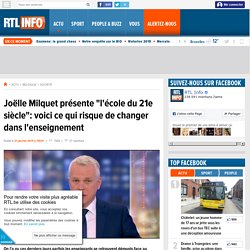
Le document devrait être finalisé en avril 2016, selon le calendrier présenté par la ministre de l'Enseignement Joëlle Milquet. "Nous partons des acteurs plutôt que des structures", a-t-elle plusieurs fois souligné. Comme annoncé dans la Déclaration de politique communautaire, le gouvernement de la FWB a décidé de se doter d'un pacte en vue de renforcer la qualité de l'accompagnement et de la formation des différents acteurs de l'enseignement, en ce compris les élèves. Fuites en pagaille à l'école! - Vidéo - RTL TVI. Forget university? 4 steps to design your own education. Brain, Mind, Experience, and School: Expanded Edition - Committee on Developments in the Science of Learning with additional material from the Committee on Learning Research and Educational Practice, National Research Council, Division.
E-portfolio Jacques DELMAS - portrait chinois. MySchool - Web Based School Management Software. Student information system. A student information system (SIS) is a software application for education establishments to manage student data.
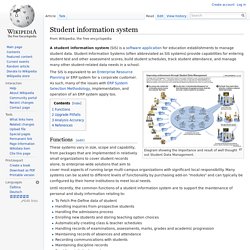
Student Information Systems (often abbreviated as SIS systems) provide capabilities for entering student test and other assessment scores, build student schedules, track student attendance, and manage many other student-related data needs in a school. Diagram showing the importance and result of well thought out Student Data Management. The SIS is equivalent to an Enterprise Resource Planning or ERP system for a corporate customer. As such, many of the issues with ERP System Selection Methodology, implementation, and operation of an ERP system apply too. Functions[edit] These systems vary in size, scope and capability, from packages that are implemented in relatively small organizations to cover student records alone, to enterprise-wide solutions that aim to cover most aspects of running large multi-campus organizations with significant local responsibility.
References[edit] Education. Radical rfid school management system ppt. Citizen Schools: Learning to rebuild democracy. A 'Citizen School' is a school that explicitly creates a democratic culture through its role as a civic institution.
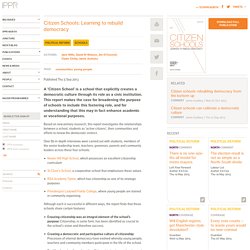
This report makes the case for broadening the purpose of schools to include this fostering role, and for understanding that this may in fact enhance academic or vocational purposes. Based on new primary research, this report investigates the relationships between a school, students as 'active citizens', their communities and efforts to renew the democratic instinct. Over 80 in-depth interviews were carried out with students, members of the senior leadership team, teachers, governors, parents and community leaders across these four schools:
Schools Co-operative Society - Home of Co-op Trusts & Academies. Recherche - Sur educpros.fr - Educpros.fr. EducPros (Educpros) A collection of Arthur's publications & writing. Inside the schools that dare to break with traditional teaching. On 21 October 2015, we will finally arrive at the point in time that Marty McFly travels to in the 1989 sci-fi sequel, Back to the Future II.
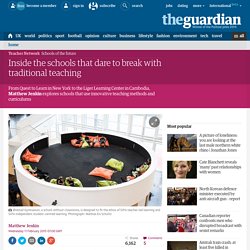
But if a teenager today were to drive Doc Brown’s DeLorean back to Hill Valley High, the film hero’s fictional school, would he or she notice any difference? Just as we are still waiting for someone to market hoverboards and self-tying shoelaces, we have yet to see a radical shift in teaching models, despite the ebb and flow of education reforms. Alastair Creelman (@alacre) Valentina G. (@ValentinaGaroia) European Schoolnet (eu_schoolnet) We Are All Open Educational Resources. The recent OER15 conference was a festive meeting of Open Educators from all over the world sharing good practices, lessons learned and research findings on Open Practices in Education or OEPs, a field with many facets and options as described in the 50 Shades of Open Education post.
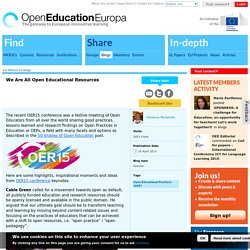
Here are some highlights, inspirational moments and ideas from OER15 conference keynotes. Cable Green called for a movement towards open as default; all publicly funded education and research resources should be openly licensed and available in the public domain. He argued that our ultimate goal should be to transform teaching and learning by moving beyond content-related issues and focusing on the practices of educators that can be achieved with a shift to open resources, i.e. “open practice” / “open pedagogy”. Josie Fraser reported from the “Digital Literacy Leicester Project” helping mainstream OER in the City of Leicester schools. Mobile Learning in Context Contributing Editor Janet Clarey.
April 8, 2015 Contributing Editor, Janet Clarey When people talk about customary approaches to eLearning, they usually envision self-paced courses, tutorials, and synchronous virtual classroom training.
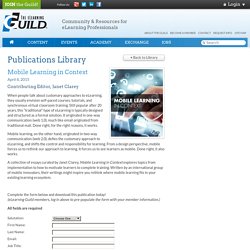
Moocs4all. e4innovation.com. Grainne Conole (@gconole) Uk.businessinsider. Ecole à la Maison. 13 year old Logan quits school and starts home schooling education system - TED. 8 Myths That Undermine Educational Effectiveness. Certain widely-shared myths and lies about education are destructive for all of us as educators, and destructive for our educational institutions.
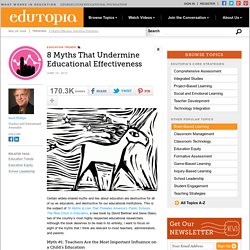
This is the subject of 50 Myths & Lies That Threaten America’s Public Schools: The Real Crisis in Education, a new book by David Berliner and Gene Glass, two of the country’s most highly respected educational researchers. Although the book deserves to be read in its entirety, I want to focus on eight of the myths that I think are relevant to most teachers, administrators, and parents. Myth #1: Teachers Are the Most Important Influence on a Child’s Education Of course teachers are extremely important. A clearinghouse for information on class size & the proven benefits of smaller classes.
Class size matters a lot, research shows. Getting Excited About Engineering with Super-Awesome Sylvia. The following excerpt is from “Sylvia’s Super-Awesome Project Book (Volume 2): Super-Simple Arduino” by “Super Awesome” Sylvia Todd.
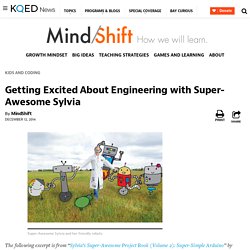
What’s an Arduino?? The Arduino is an awesome programmable prototyping platform. It’s a little computer that acts like a brain for robots, sensors, or other machines that connect to the real world. Differentiation Doesn't Work. Commentary —Chris Whetzel for Education Week By James R.
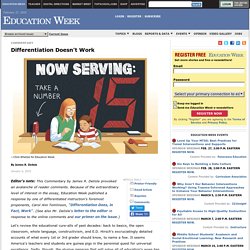
Delisle Editor's note: This Commentary by James R. 138 Influences Related To Achievement - Hattie effect size list. John Hattie developed a way of synthesizing various influences in different meta-analyses according to their effect size (Cohen’s d). In his ground-breaking study “Visible Learning” he ranked 138 influences that are related to learning outcomes from very positive effects to very negative effects. Hattie found that the average effect size of all the interventions he studied was 0.40. Therefore he decided to judge the success of influences relative to this ‘hinge point’, in order to find an answer to the question “What works best in education?” OpenDiscoverySpace. TEDxWestVancouverED. The power of student-driven learning: Shelley Wright at TEDxWestVancouverED.
What 60 Schools Can Tell Us About Teaching 21st Century Skills: Grant Lichtman at TEDxDenverTeachers. Progressive education. Progressive education is a pedagogical movement that began in the late nineteenth century; it has persisted in various forms to the present.
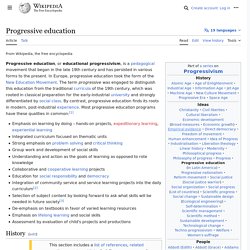
The term progressive was engaged to distinguish this education from the traditional Euro-American curricula of the 19th century, which was rooted in classical preparation for the university and strongly differentiated by social class. By contrast, progressive education finds its roots in present experience. Most progressive education programs have these qualities in common:[citation needed] Educational theory[edit] John Dewey. John Dewey (/ˈduːi/; October 20, 1859 – June 1, 1952) was an American philosopher, psychologist, and educational reformer whose ideas have been influential in education and social reform. Dewey is one of the primary figures associated with the philosophy of pragmatism and is considered one of the fathers of functional psychology.
A Review of General Psychology survey, published in 2002, ranked Dewey as the 93rd most cited psychologist of the 20th century.[3] A well-known public intellectual, he was also a major voice of progressive education and liberalism.[4][5] Although Dewey is known best for his publications about education, he also wrote about many other topics, including epistemology, metaphysics, aesthetics, art, logic, social theory, and ethics. He was a major educational reformer for the 20th century. The overriding theme of Dewey's works was his profound belief in democracy, be it in politics, education, or communication and journalism.
Life and works[edit] Democracy and Education. Democracy and Education: An Introduction to the Philosophy of Education is a 1916 book by John Dewey. Dewey sought to at once synthesize, criticize, and expand upon the democratic (or proto-democratic) educational philosophies of Jean-Jacques Rousseau and Plato. [citation needed] He saw Rousseau's philosophy as overemphasizing the individual and Plato's philosophy as overemphasizing the society in which the individual lived.